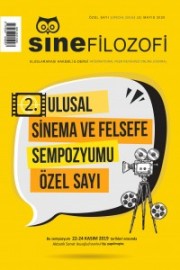Arketipsel Eleştiri BağlamındaTender Mercies Filminde Bireyleşme
Individuation in the Film Tender Mercies: An Archetypal Approach
Author(s): Murat Küçükhemek, Meral SerarslanSubject(s): Psychology, Ancient Philosphy, Film / Cinema / Cinematography
Published by: Serdar Öztürk
Keywords: Carl G. Jung; archetype; anima; animus; individuation; Tender Mercies;
Summary/Abstract: According to Jung, the term archetype is synonymous with Plato's 'original ideas' and plays a key role in understanding mythological images. Archetypes, which are special psychic phenomena that bring body and psyche together, are not vivid images, such as images of memory, the product of a person's past lives. With their unique energies, archetypal patterns wait to be released in the psyche, and they are released in the form of creative acts, symbols, myths, dreams, and films. An archetypal form, if it is released, takes the form of symbols and images, and acts through the unifying opposites. This may be one of the reasons why cinema is considered an effective the analytical psychology tool. In cinema based on a fictional fantasy, a symbolic state in a formal and structural position can create a meaning equivalent to our spiritual state. The archetypal images of individuation, which are persona, shadow, anima-animus, and the Self, and which play a very important role in the formation of personality, have a central place in Jungian analytical psychology. Jung uses the term ‘individuation’ to illustrate the process by which a person becomes a psychologically indivisible unity or wholeness. The aim of this study is to determine the appearance of archetypal images within Bruce Beresford's Tender Mercies and their role in the process of individuation. In Tender Mercies, which was analyzed by archetypal criticism, it was seen that the main character Sledge's search for meaning and the psychological transformation that he began to live in coincided with Jung's concept of individuation.
Journal: SineFilozofi
- Issue Year: 5/2020
- Issue No: Sp. Iss
- Page Range: 550-569
- Page Count: 20
- Language: Turkish

